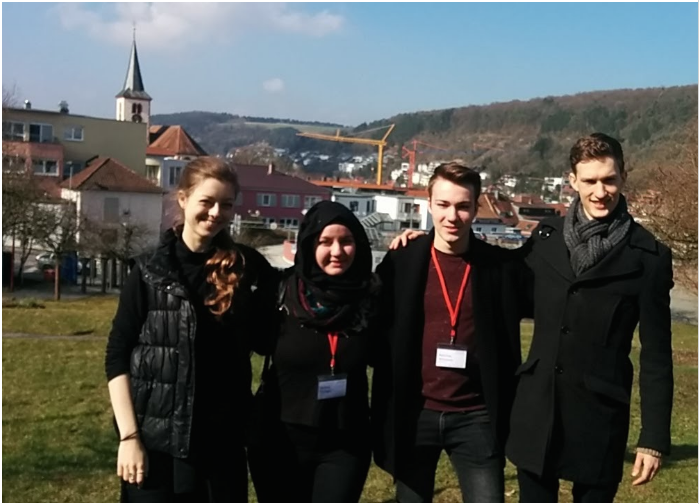Trinity On Tour
Monschau

Our first common journey with the team led us to the small resort town Monschau in the Eifel region of western Germany. For the weekend from the 2nd to 4th of March we stayed in the castle of Monschau for team building purposes. We traveled with bus and train via Aachen to Monschau. During the ride it started snowing which is why it we were granted a wonderful view at our arrival. We had to walk through the snow-covered city up to the castle late at night and met a man dressed as a medieval guard soldier, who explained us the quickest way to the castle. The next morning we held our first team building exercise in the castle, guided by one of our advisors. The aim was to estimate our own strengths and thing about the area of responsibility in which we can use our abilities the most. It started with a little game about ourselves. We made a poster with different important characters in a team like “planner and manager” or “creator” and everyone listed themselves under one or more categories. Then we asked for every person how the team members would categorize this person and if they agree with the self-assessment. After lunch we explored snowy Monschau in daylight, took pictures together and looked for souvenirs. Back at the hostel we met again to hold our next seminar connecting to our previous one. Now we started to plan the structure of our team and decided that it is beneficial to have three main coordinators for our “trinity” with three different tasks: a team leader, a social-media-representative and a laboratory-manager. After the hard part our advisor had planned some games for us with the main focus on communication. The first is called “Gordian Knot” where we all stood in a circle and had to grab two random hands. Then the challenge was to unknot everyone without letting go of the hands in order to rebuild the circle. The next game was a bit more difficult. We divided the team into 4 groups and decided on a leader in each group. Each member of each group got different cards from a normal card-set and we had to sort them in a specific way. During the game we were not allowed to speak and only the leader knew the task we had to do. We were only allowed to communicate with little notes, which was not easy for us. The team who used the fewest number of notes won the game. In the evening hunger overcame us and led us to an Italian restaurant overlooking the half-frozen river “Rur“. Our last evening in Monschau was completed with a cozy get-together with card games. The next day, after breakfast, we set out home after a successful, wonderful weekend in the Eifel.

Mosbacher Kolloquium
69. Mosbacher Kolloquium - "Synthetic Biology - from Understanding to Application"
The GBM "Gesellschaft für Biochemie und Molekularbiologie e. V." in English "Society for biochemistry and molecular biology" (e. V. = registered society/association) welcomed us to their annual colloquium of Mosbach "Mosbacher Kolloquium". The 69th colloquium was titled "Synthetic Biology - from Understanding to Application". The scientific organizers of the Mosbach Colloquium 2018 were Victor Sourjik (Marburg), Anke Becker (Marburg), Wilfried Weber (Freiburg) and one of our professors, Matias Zurbriggen (Dusseldorf). The Mosbacher Kolloquium is an opportunity to establish contacts, to find orientation in the research landscape or to receive detailed technical knowledge for your own projects. It’s for students of every stage of education since there is something for everyone. We were fortunate enough to have formed a carpool with students from the jGBM ("Junior GBM") who gave us valuable tips about the colloquium.

Of course, the main focus were the science talks: One interesting talk was by Hannah Wagner from the University of Freiburg, who synthesized a positive feedback loop with molecular switches. Mustafa Khammash from the ETH Zurich spoke about the application of optogenetics in synthetic biology and provided the Mosbach Colloquium with several posters about his research, which were represented at the poster sessions. The general take-home-message was that synthetic biology is the chance to understand what life is. As Nobelist (1965) Richard Feynman said:
“What we cannot create, we do not understand.”
In addition to the science talks, a get-together "Get to know iGEM" was organized for current and former iGEM participants and interested parties. iGEM Hamburg, iGEM Marburg and former participants of iGEM Darmstadt among others attended.
We discussed how to establish the iGEM competition in an university and were given advice on conflict counseling in the team and on sponsorship. We also motivated those interested to apply for their university iGEM-team next year or even to form an iGEM team themselves.

